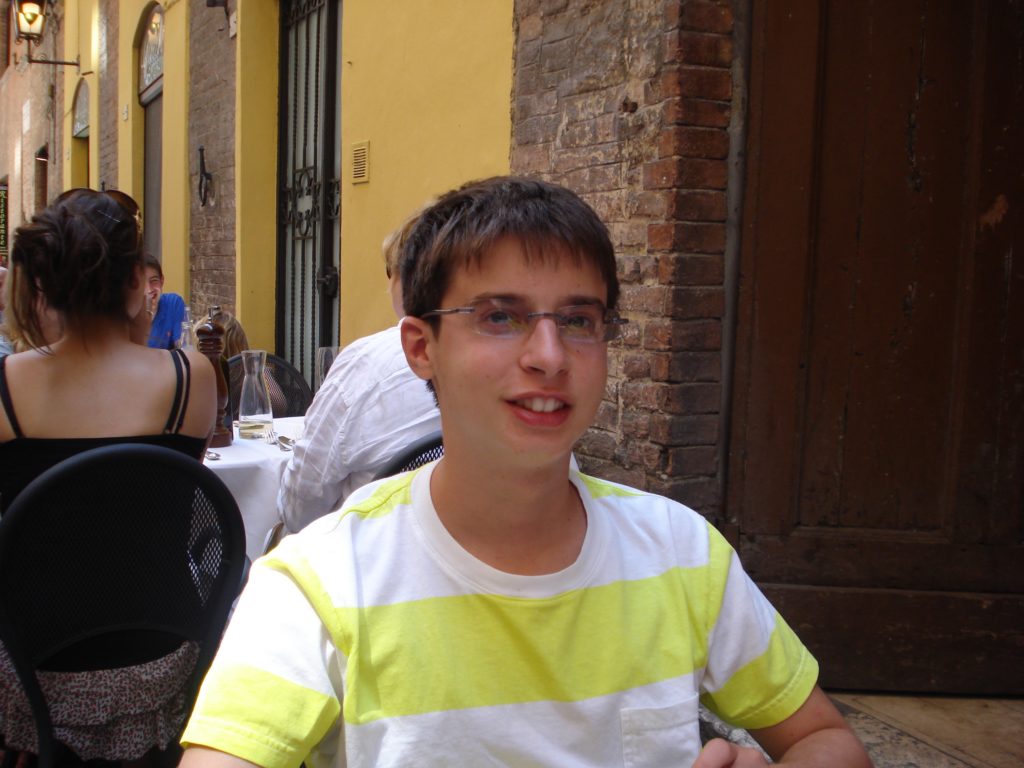Like other parents, I’ve had common nightmares and fears, such as my children being kidnapped or getting in trouble with the law. Given my son Diego’s autism and intellectual disability, I have feared police scenarios a little more keenly than most.
I know other parents with “special” children have to worry. It’s pretty natural, given some sad stories between the autism community and law enforcement, whether in the East Coast, Midwest or West Coast.
When he was young, Diego was not one to wander away, ever. Nonetheless, I was afraid that if he did get lost, he wouldn’t know what to do, and that he would trust an evil kidnapper who offered him candy and told him he’d take him back to his mom.
Later on, as Diego grew older and reached the peak of his anxious period as a teenager, he would at times scream (in public and private) or hit me (in private). I feared he might hit someone at school or that screaming in public might stir the wrong reaction from law enforcement and, thus, the legal system.
Diego stands out in some ways too. He makes strange sounds at times; says hi to girls he doesn’t know; talks to himself; and misinterprets personal space, frequently bumping into people or standing too close. I’ve feared that these behaviors could also get him into trouble because, when you’re an adult, they can!
None of my worst fears have come to pass, I am happy to write. No one has ever reported feeling threatened by Diego (except the Catholic Church, but that’s a story for a future post).
I have found that people in my corner of the country are not afraid of Diego, a skinny, white, (and cute 😊) adult male who acts weird. Our family’s three encounters with the police would suggest this. However, I also sense that our experience has been positive compared to that of some other people.
Before describing the encounters, though, I also want to make clear that Diego did not “cause” any of them, even though they all involved him.
Encounter #1: Diego was 12 and got “lost”… but not really 🙃

Following a family celebration at my sister’s house, I went shopping with a couple of relatives, while Andres (my younger son) stayed with his grandmother, and Cesar (my husband) and Diego returned home.
At home, Cesar and Diego hung out for a while and then each went to do their own thing. Cesar’s destination was our bedroom where he quickly fell asleep with the TV on.
When Cesar woke up a little later, he couldn’t find Diego anywhere! He looked and looked: in the garage, under the beds, up and down our street. He knocked on neighbors’ doors and called the home of a family we had recently visited. He called Diego’s grandmother and posed a question that would reveal if Diego was there without raising alarm. (My mom would have had a heart attack if she thought Diego was missing.) Cesar was so beside himself that he kicked a door in the garage and made a hole in it.
As one would expect, Cesar soon called the police. He resisted calling me to explain what was happening because he feared, correctly, that I could have a fatal panic attack. Eventually though, he came up with the idea of calling and asking me to please come home right away because he was feeling sick.
I was annoyed, of course. Really? He’s so needy, I thought.. When I don’t feel well, I suck it up and let him go about his business. All the same, I headed home.
When I got there, I found a police car and an ambulance in the driveway. Naturally, I felt alarmed and guilty: Cesar must truly be seriously ill. I got out of the car and a perfectly healthy looking Cesar approached me. Instantly, I knew this was about Diego or Andres and my heart started beating incredibly fast.
“Diego is missing,” someone said. My body just dropped to the ground as if my whole skeleton had melted. Somehow, my brain continued to function and I managed to say something about Diego’s movie plans with our friend Caro.
It had all been a horrible mistake! I thought I’d told Cesar. I thought he’d heard. I thought he knew. I had thought WRONG. Cesar didn’t know that Caro was taking Diego to the movies to see “Happy Feet”. Caro had picked Diego up when Cesar was asleep and Diego had assured her that he’d said good-bye to dad.
Shortly after the situation became clear, Caro merrily drove in with Diego. Diego was happy as a lark and amused by the presence of the ambulance and police car. The officers spoke to Caro and Diego to confirm that all was fine, wished everyone a good day, and left.
Encounter #2: Teenage Diego (and I) go through a tough time 😔

Diego was about 15 and going through the most difficult stage in his life. Imagine wanting, just like others your age — a friend group with shared interests, a college life to look forward to, and maybe romance, but a combination of society and your autism gets in the way. Add hormones and changing meds, and Diego was righteously irritable and insecure.
I was in the car, about to leave for my first day back to work after the long summer break (I’m a teacher). Diego came out to the driveway and began to whine and then to scream and then to holler because he did not want me to go.
I was exhausted at the time, so I too quickly escalated to screaming and hollering as I tried to lead Diego back into the house. I can’t recall exactly how it all unfolded, but Andres remembers being woken up and hearing the screaming. The scene ended with me pushing Diego into our pool! After that, we were both calmed down and went back to the house.
Once things were quiet enough and I was about to leave again, the doorbell rang. A police officer was at the door. A neighbor had called 911 – that’s how horrendous the screaming had been! I opened the door and explained to the kind officer that my son had autism, that he’d had a meltdown, and that all was well. Diego walked over looking fine and said a few words to the officer. Reassured, he wished us a good day and left.
Encounter #3: Diego, now an adult, shows his bravery 🦁

A few years ago, when Diego was 22, Cesar and I went out to dinner at a friend’s house. Diego was at his grandmother’s house when we left and, later on in the evening, his aunt dropped him off at home. (We were to arrive shortly after.)
I, not thinking straight, had left the alarm system on and it went off when Diego opened the door to the house. When the alarm goes off (which it sometimes does “by accident”, usually caused by me), the alarm company calls our cell phones, asks us for our secret code word and disables the alarm. Cell phone reception was bad at our friends’ home, so it was not until we were walking out the door that I got a signal and noticed multiple missed calls and voice messages from Diego, the alarm company, and an unknown number.
I did not have a chance to hear the messages because another call came in just then. It was a police officer who was at home with Diego and was trying to figure out how to turn off the freaking alarm. I gave him the password and began the short drive home.
When we got there, we found the officer waiting for us, and Diego already in bed. Diego was proud of himself and told us that he had been brave and that he had just gotten into his bed and covered his head. Gladly, Diego’s anxiety and behaviors had improved immensely since their peak a decade before, and he was able to manage the situation.
The officer was kind and professional, and confirmed that our son had been fine and had not panicked or anything. I was relieved and thanked him profusely. I was so overcome with gratitude that I did not know what to do! I just gave the officer a big hug before he left.
What do these encounters show?
First, that two of them were preventable were it not for my forgetfulness; second, that Cesar is a forgiving person, as he never complained that I’d put him through one of the worst hours of his life when Diego got “lost”; third, that my town’s police department is responsive and professional.
Sometimes, however, I feel that we were lucky and got away kind of easy. For each incident, there could have been other outcomes had the officers made false assumptions. They could have thought, for example, that we were neglectful or unfit parents who could not take care of their disabled child or even keep track of where he was. They could have assumed that Diego was a trespasser or even a burglar. These assumptions may have led to investigations, to visits from social workers, or even an arrest.
I believe that, in some measure, none of this happened (gladly), because we benefit from a series of privileges. For one, we live in a certain town in Connecticut where the police force serves a community that sees minimal crime and has a population of, on average, highly educated, well-to-do, often entitled people. The dynamic between police and community is one of trust and cooperation.
I also believe that Diego’s physical appearance protects him. At 25, Diego is a thin, white, sweet-looking young man. He looks vulnerable and harmless (which, by the way, he also happens to be). I know that this is just a stereotype, and that the fact that it benefits him necessarily entails that it harms others who don’t fit it.
A few years ago, Diego was walking down the street ahead of me and he took a random lady’s hand. He only held it for a few seconds before the woman took a look at Diego, drew away her hand and continued on her way. I wonder: Would her reaction have been different if Diego didn’t look the way he does?

